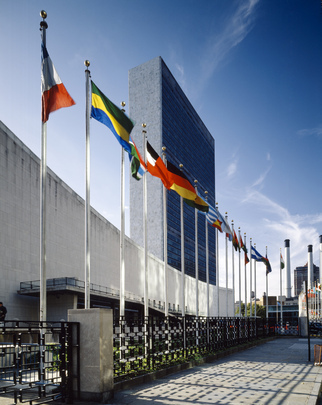
UNITED NATIONS - Former Portuguese Prime Minister Antonio Guterres again topped a straw poll for the ninth U.N. Secretary-General of the United Nations. But ballots for the 11 candidates showed many negative votes, signaling a deadlock until the next poll -- or the one after that.
Guterres, until recently, was the UN High Commissioner for Refugees, a post he held for 10 years. On Friday the 15 UN Security Council members voted for the second time and gave him 11 "encouragements", two "discouragements", and two "no decisions". In the previous poll he received 12 encouragements and three "no decisions."
His tally showed that despite his high standing, negative votes were mounting for each candidate. Said one Council diplomat: "There is no sure bet for at this time. It is getting tougher for all of them."
In a convoluted procedure, all 15 Security Council members vote for each of the 12 candidates, casting a total of 180 ballots. There was no distinction among the veto-bearing five -- the United States, Russia, China, Britain and France -- who will have the final word. The voting is secret and the results are secret, a peculiar decision since they spread quickly.
The lack of transparency is unusual since General Assembly President Mogens Lykketoft insisted each candidate appear for questioning before the full U.N. membership, the first time this occurred in the 70-year history of the organization.
In second place was Vuk Jeremic, a dynamic former Serbian foreign minister and a former president of the UN General Assembly. He received eight votes in favor, four against, and three no decisions. It is questionable whether the Western countries will support him.
Third, was Susana Malcorra, the foreign minister of Argentina, said to be a favorite of the United States and until recently was the chief of staff for Ban Ki-moon. She got eight votes in favor, six against and one no decision.
And women? Despite the valiant lobbying of Colombian Ambassador Maria Emma Mejia seeking support for a female secretary-general, it appears this is more of a hope than a reality this year.
Eleven candidates are in the race so to replace Secretary-General Ban Ki-moon, whose 10 years in office expires in December. Seven are from Eastern Europe, which insists on a turn for secretary-general. Three are women, one of them already more or less eliminated in the informal poll and another withdrew this week. The other four from outside the region include three women and one man.
More often than not, the contest of wills among five veto-bearing countries reflects parochial interests rather than what is best for the organization. How the election will be resolved should tell people a great deal about who will influence the world body in the next five years.The other candidates are: In order of votes received, they include Danilo Turk in fourth place. He was the former president of Slovenia, a former high-ranking official in the UN Political Affairs Department and in second place in the previous poll; Irina Bokova, the director of the UN Educational, Scientific and Cultural Organization (UNESCO), Srgjan Kerim, a former Macedonian foreign minister and UN General Assembly president; and Helen Clark, the former New Zealand prime minister and head of the UN Development Program.
Low on the list were Cristiana Figueres of Costa Rica, who championed the UN climate change operation; Natalie Gherman, the former deputy prime minister of Moldova; Miroslav Lajčák, Slovakia's foreign minister and the former High Representative for Bosnia; and Igor Lukšić, foreign affairs minister of Montenegro.
Vesna Pusić, a professor and former foreign minister of Croatia, withdrew her candidacy this week.
Unknown is whether Russia will insist on an Eastern European secretary-general, a region that that is a leftover from the Cold War since most of its member nations are in the European Union. Yet its candidates have argued that these countries opened their borders that resulted in the fall of the Berlin Wall in 1989 and that the area has never had a secretary-general.
A secretary-general is expected to be the chief administrator of the world body, although individual fiefdoms often hinder his actions and the UN Security Council often has the last say. For many diplomats, he is supposed to bring crises to the United Nations and be a strong communicator. Ban Ki-moon of Korea, who has a strong record on climate change and gay rights, prefers to travel around the world at least two weeks of nearly every month.

